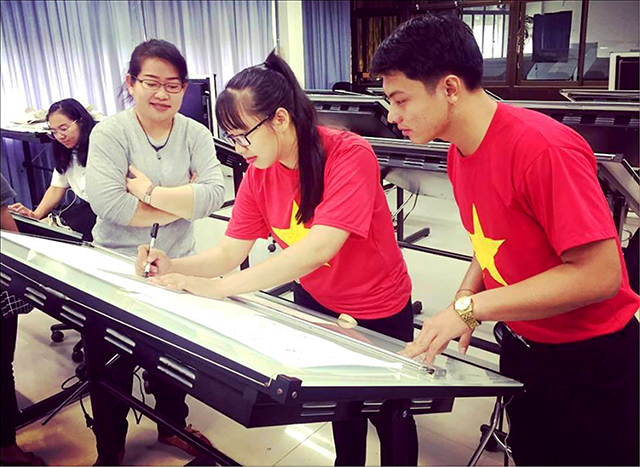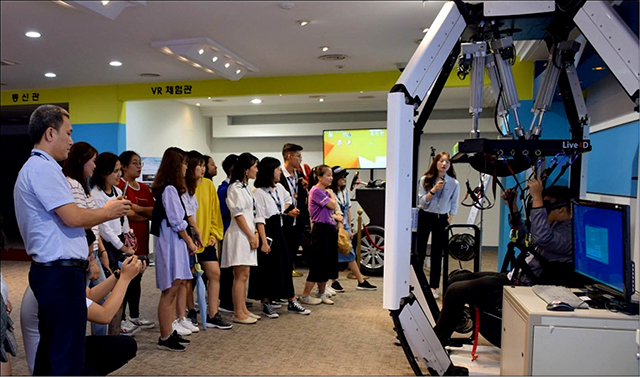
University of Agriculture and Forestry’s students were instructed by Thai lecturers
Focus on student exchange
In 2 months alone (July-August 2018), University of Agriculture and Forestry, Hue University had 4 international student exchange activities, of which 2 series of students from University of Agriculture and Forestry came to Thailand, and conversely, 2 series of the students from Ubon Ratchathani University (Thailand) and Kyoto University (Japan) to Vietnam. Compared with the previous period, the international cooperation and student exchange are not only increased in quantity but also developed in quality.
Typically, on the recent trip to Thailand, aside from cultural exchanges, visiting the learning facilities of the partner university, the students of University of Agriculture and Forestry, Hue University also joined in ASEAN Community student exchange program with the contests of skills in animal husbandry and veterinary services. Dr Duong Thanh Hai, the team leader, said that the activities on the trip were rich in practical experience, showed what skills the students were weak in upon entering the international "arena".
Currently, most of the member universities, faculties under Hue University focus on student exchange activities. In particular, University of Foreign Languages is a very active implementation unit. Phan Thanh Tien, Deputy Head of the University Training Department, said that the student exchange activities started in 2007 and have developed strongly since 2010 when many ties have been expanded.
Every year, University of Foreign Languages organizes about 200 to 250 students to the countries joining in student exchange programs, especially to the universities in Japan, Korea, China and Thailand. Conversely, 50 - 80 foreign students also come and study at University of Foreign Languages every year.

The delegation of Hue University of Economics’ students were given an overview and experienced new technologies at Institute of Electronics and Telecommunications (Korea)
Apart from short-term trips, some universities also increase student exchange time and diversify forms including internship, exchange from 3 months to 1 year, and association and credit recognition. The content of the program is studied, discussed more and more thoroughly between the universities of the two countries in order to produce practical effects.
“On the trip to Korea last September, the delegation engaged in basic Korean language communication classes. Solbridge University's professors provided students with practical and useful technical content of business negotiation skills, job interview experience, and so on. In addition, the delegation made field trips to two multinational companies and one research institute; visited the places where students have long accessed only through television and newspapers." Phan Thanh Hoan, Head of University Training Department, University of Economics, Hue University related.
At present, some units also study, consider the appropriate time and combine many activities in order to bring many benefits. For example, this year’s student exchange program of University of Medicine and Pharmacy took place at the same time with the 2nd International Conference on Health Challenges in Sustainable Development Goals (23-24 July, in Khon Kaen Province, Thailand), whereby students could listen to and discuss a number of emerging health topics in Southeast Asia, and update more technical knowledge as well as scientific research skills.
Benefits multiplied
Although the exchange activity time is short compared with the university education process, according to many students, the benefits are enormous, especially improving the ability to communicate in foreign languages and skills. Tran Minh Tinh, a student of the Faculty of Land Resources and Agricultural Environment, University of Agriculture and Forestry, shared: "On the last trip to Thailand, I and my friends experienced the rice cultivating festival and participated in the study under the guidance of Thai partner university’s doctors and lecturers. Therefore, we had many opportunities to communicate in English and practice expertise and skills. The knowledge and skills learned were tested; thereby the drawbacks were recognized to overcome.
In addition to benefiting students directly involved in the exchange program, this activity also spreads its value among students who have not had the opportunity to engage in. According to the university representatives, student exchange programs are often registered by many students, so the strict criteria are established to choose, including foreign language, skills and expertise criteria. This provides the motivation for students to learn and practice skills. In addition, the students who joined in will connect, offer opportunities for long-term exchanges and create an environment for the students of the same class and faculty to connect.
Well aware of the benefits, the educational institutions are exploring and expanding their cooperation with more countries. The biggest obstacle is that students that join in some programs need to spend quite a lot of funds, so the units are strengthening cooperation with the foreign partner universities on the basis of exchange, mutual support to facilitate students. The faculties in a linkage role will give a boost to developing this activity.
In the future, the universities under Hue University will do many activities to improve the foreign language levels, necessary skills and expertise for students, and make it possible for students to access soon and engage in many student exchange activities with foreign partner universities.
Story and photos: Huu Phuc